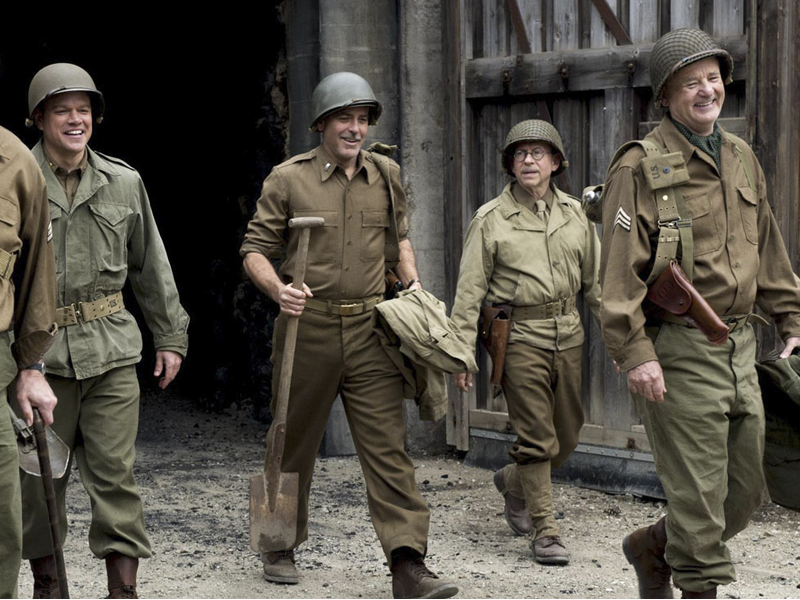
“The Monuments Men” was one of those movies that I went into with high hopes. Even with the troubling news that the release date was pushed back from Dec. 18 to Feb. 7, I still thought that the interesting premise and star-studded cast would be handled with the artistic grace that is expected of a man as talented as George Clooney, who’s both the main star and director of the film. But with a story lacking in character development that’s entrenched in too much of a “remember the good ol’ days” sentimentality, Clooney’s film lacks the type of highbrow artistic endeavor it clamors to defend.
“The Monuments Men” is a “based on a true story” movie that follows Frank Stokes (George Clooney) as he assembles a motley crew of art historians, curators and architects to join the U.S. army in the fight against the Nazi threat during World War II. However, the actual threat these men are combating aren’t the publicly known atrocities committed by the Nazis, but rather the lesser-known crime of looting countless pieces of art from public museums and private collectors.
The writing, especially concerning its attempt at ambiance and style, is what really let the movie down. In directing the movie, it felt as though Clooney was trying to create a family-friendly version of “Saving Private Ryan,” with all the seriousness but less actual drama and death. What the movie’s writing suffers from is a serious case of not following the “show, don’t tell” rule: We are repeatedly told over and over again, from rambling speeches to small, private patches of dialogue, just how important Stokes’ mission is. This really hurts the movie’s plot, for not only does that routine of self-congratulation quickly get old, but any suspense that the movie attempts to build is crushed under the weight of it flaunting its self-importance. Adding insult to injury, the audience never truly feels connected to the pieces of art that the men are saving. We are given small glimpses of famous paintings and sculptures here and there, but other than that, the art pieces themselves might as well be the headers for the plot points written on paper.
A really annoying aspect of the plot that stuck out like a sore thumb concerns Matt Damon’s character James Granger. In the movie, it comes down to Granger to speak to Claire Simon, played by Cate Blanchett, who knows the location of several pieces of art that the Nazis stole. As a member of the French Resistance, Simon spends much time squandering Granger’s plans to help her recover the art because of the simple fact that she believes the invading American forces will never return any valuable art that they find. Never mind the fact that Granger doesn’t even think about going to the U.S. Army so they can directly inform Simon of their intentions to return the art; what’s even worse is that the specific location of the art that Granger is ordered to ask Simon about is found by the dumbest of flukes. This not only entirely negates everything that Granger and Simon had been working together for, but also the weak and unrealized romance between them that never gets off the ground amounts to useless plot fodder that could be cut from the script.
The film’s cast is one full of A-listers that are among Hollywood’s finest. With George Clooney, Matt Damon, Bill Murray, John Goodman and Jean Dujardin, the acting was fine along the entire journey. As the lead, Clooney is able to pull off the sophisticated, highbrow look that makes him stand out as a university professor in the movie. Aside from one or two of Clooney’s uber-patriotic speeches, no other cast member stands out above the rest in their roles. This, of course, has to do with the film’s writing, which offers no room for character development. One scene was almost the exception, involving Bill Murray playing his child’s recording of “Have Yourself a Merry Little Christmas” over the Army camp’s loudspeaker. It’s a well-done scene, and Murray sells it well, with tears and all. But the scene’s camera work, which transitions between Bill Murray crying alone to the dead and dying inhabitants of a military infirmary, ruins the sentimentality that we’re supposed to feel for Murray’s character with its obvious irony. Instead of feeling sweet, the scene just feels bitter — and overdone for its own sake.
The movie’s musical score is nothing special, either. Written by Alexandre Desplat, the music feels less like authentic marching band music and more like Desplat possesses an inferiority complex in comparison to acclaimed composer John Philip Sousa. This merely adds to the cheesy, black-and-white feeling that the movie has, and is nothing to be proud of.
With such an interesting premise and fantastic cast, “The Monuments Men” could have been so much more than the actual end product. In any artistic endeavor that Clooney had in mind with this movie, it’s simply unmonumental.
Rating: 2 stars








